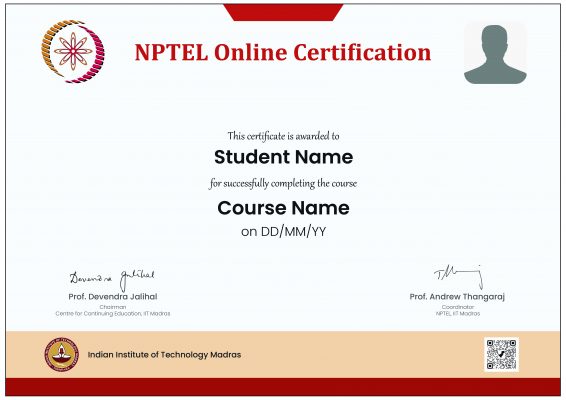Description
Embedded Systems surround us in the form of gadgets and devices that we use. There is no aspect of human lives, which is untouched by such devices at home or for health diagnostics, transportation, entertainment. Learning out Embedded Systems will give the skills to design and manufacture embedded system products of the future which will help participants towards better employability. This course teaches embedded system design using a building block approach, which allows one to visualize the requirement of an embedded system and then to design it efficiently. The course will teach embedded system design using a microcontroller, namely Texas Instruments MSP430 low power microcontroller. The course will introduce various interfacing techniques for popular input devices including sensors, output devices and communication protocols. It will teach power supply design for embedded applications. It will also teach effective embedded programming techniques in C and how to maintain code using GIT. It will have a significant practical component, which will be achieved through a MSP430 microcontroller kit, to be distributed for free, to selected participants.
INTENDED AUDIENCE
PRE-REQUISITES
INDUSTRIES SUPPORT
ABOUT THE INSTRUCTOR

Dhananjay V. Gadre (New Delhi, India) completed his Ph.D. in Instrumentation and Control Engineering from University of Delhi. He has a M.Engr. (Computer Engineering) from the University of Idaho, USA after his M.Sc. (Electronic Science) from the University of Delhi, South Campus and B.Sc. (General with Electronics) from the Atma Ram Sanatan Dharma College, University of Delhi.Prof. Gadre teaches at the Netaji Subhas University of Technology (formerly Netaji Subhas Institute of Technology) in the Department of Electronics and Communication Engineering, currently as an Associate Professor. He is also the founder director of CEDT and TI-CEPD.
At NSUT, he established two open access laboratories, namely Centre for Electronics Design and Technology (CEDT) and Texas Instruments Centre for Embedded Product Design (TI-CEPD). CEDT started functioning at NSUT (NSIT at the time) under his guidance in 2003 and has trained more than 5000 students in various activities related to hands-on electronics and system design. TI-CEPD started as a result of an MOU between Texas Instruments India and NSIT in 2012, under his direction. At TI-CEPD, he organized month-long, hands-on “Internship Workshops on Embedded System Design” for undergraduate and postgraduate engineering and science students, PhD scholars and young faculty and 12 such workshops were organized between June 2013 and July 2017 benefiting around 1000 participants. Activities in these two labs have resulted in many projects, products, and publications including books as well as mentoring of a few startups and providing help and guidance to science related NGOs.
Since 2001, he has been a member of an expert committee constituted by Centre for Development of Advanced Computing (CDAC), Pune for their flagship post graduate diploma program in Embedded System Design (DESD). This program has been running continuously for more than 20 years and has graduated more than 15,000 professionals in this field. Since January 2018, he has been an editor of IETE Journal of Education. Also in 2018, he received an invitation to be an adjunct faculty at IIT Jammu.
Prof. Gadre is keenly interested in creating content and pedagogy material for online learning. In September 2020, his first Massive Open Online Course (MOOC) on ‘Introduction to Embedded System Design’ was launched on the NPTEL platform of the Swayam portal of Government of India. This course is suitable for undergraduate and postgraduate students in science and engineering, and has been supported by Texas Instruments. This course was offered again in the January 2021 session, January 2023 session and January 2024 session at the NPTEL platform. More than seventy five thousand students registered for these four editions of his MOOC.
Since 2016 he has been mentoring schools to acquire an ‘Atal Tinkering Laboratory’ under a Niti Aayog scheme of the Government of India and to help the selected schools run these laboratories efficiently. In December 2020, AICTE launched the IDEA Lab scheme. Prof. Gadre was co-opted as a founding member of the National Steering Committee to oversee the effective operation and implementation of the IDEA Lab scheme. Recently, he was granted an Indian Patent on Automatic Rangoli Printing Machine.
In his professional career of 35 years, he taught at the SGTB Khalsa College, University of Delhi followed by a stint as a scientific officer at the Inter University Centre for Astronomy and Astrophysics (IUCAA), Pune, designing instrumentation for use in astronomy. He has lectured and demonstrated his work extensively across the length and breadth of India and five continents, including at the World Economic Forum at Davos in Switzerland on topics related to electronics and embedded systems.
Prof. Gadre is the author of several professional articles and six books. One of his books has been translated into Chinese and another one into Greek. His recent book “TinyAVR Microcontroller Projects for the Evil Genius”, published by McGraw Hill International (New York) consists of more than 30 hands-on projects and has been translated into Chinese and Russian. His latest book on TIVA ARM Cortex M4 microcontrollers is published by Springer Nature.
His professional interests include scientific instrumentation, digital systems design and computer architecture, embedded systems and Internet of Things. He is a licensed radio amateur with a call sign VU2NOX since 1986 and hopes to design, build and launch an amateur radio satellite in the near future.

Badri N Subudhi received M.Tech. in Electronics and System Communication from National Institute of Technology, Rourkela, India, in 2008-09. He worked for his PhD from Machine Intelligence Unit, Indian Statistical Institute, Kolkata, India in year 2014 (degree from Jadavpur University). Currently he is serving as an Assistant Professor at Indian Institute of Technology Jammu, India. Prior to this he was working as an Assistant Professor at NIT Goa from July 2014 to March 2017. He received CSIR senior research fellowship for the year 2011-2015. He was nominated as the Young Scientist Awardees by Indian Science Congress Association for the year 2012-2013. He was awarded with Young Scientist Travel grant award from DST, Government of India and Council of Scientific and Industrial Research, India in the year 2011. He is the receiptant of Bose-Ramagnosi Award for the year 2010 from DST, Government of India under India-Trento Programme for Advanced Research (ITPAR). He was a visiting scientist at University of Trento, Italy during Aug. 2010 to Feb 2011. His research interests include Video Processing, Image Processing, Medical Image Processing, Machine Learning, Pattern Recognition, and Remote Sensing Image Analysis.



Reviews
There are no reviews yet.